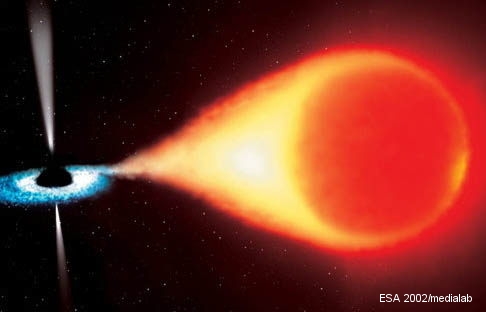X-ray binaries consist of a massive compact object, either a neutron
star or a black hole, and a close companion star, usually on the main
branch. If too close, the companion star overflows its Roche lobe and
material streams towards the compact object, forming a small accretion
disk. The disk emits radiation primarily in X-rays, but over time
this radiation exhibits a rich set of variations that is telling
us important information about the system. In particular, X-ray binaries
support a set of well-defined quasi-periodic oscillations (QPOs), some of
which are probably connected to large-scale disk oscillations and/or
disk features, which in turn depend on general relativistic
effects. As a consequence, QPOs provide a means to probe strong gravity.
I am beginning to be
interested in the various global waves
and instabilities that such disks can support and how they connect
to warps and eccentricities. The main application is to QPOs in X-ray
binaries, but
AGN, dwarf novae, and protoplanetary disks are also venues in
which this physics crops up.
The three main thrusts of my work presently are (a) the role of
magnetic fields and how they may inhibit or destroy waves and
oscillations, (b) how an imposed eccentricity excites standing
waves in the inner parts of relativistic disks, and (c) how
magnerotational turbulence interferes with these oscillations.
Another related project
aims to explain the provenance of oscillations in Be disks, which are
disks formed from material expelled from a B star.
Potential PhD topics include
*The impact of MRI turbulence on eccentricity-fueled inertial oscillations
*The impact of MRI turbulence on the Papaloizou-Pringle instability
(see figure below)
*The viability of the accretion-ejection mechanism
*The role of the disk-star boundary layer in Be disk oscillations
Recent papers:
*Quasi-periodic oscillations, trapped inertial waves and strong
toroidal magnetic fields in relativistic accretion discs
(link)
*Quasi-periodic oscillations and the global modes of
relativistic, MHD accretion discs
(link)

